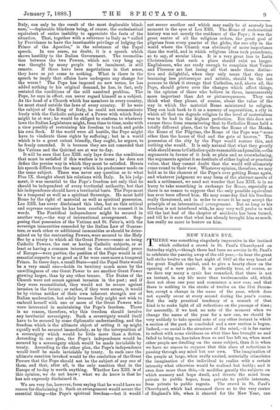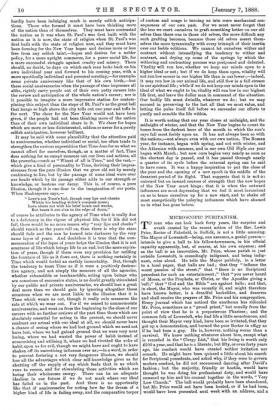NEW YEAR'S EVE.
THERE was something singularly impressive in the instinct which collected a crowd in St. Paul's Churchyard on Saturday night,—though there had been no service in St. Paul's to celebrate the passing away of the old year,—to hear the great bell strike twelve on the last night of 1887 at the very heart of the great English capital, and to give a hearty cheer on the opening of a new year. It is perfectly true, of course, as we dare say many a cynic has remarked, that there is not an instant, in any life more than twelvemonths old, which does not close one year and commence a new one; and that there is nothing in the stroke of twelve on the 31st Decem- ber, except a change in the name of the year, which does not equally occur at every second during the year's course. But the only practical tendency of a remark of that kind is to make light of all reflections on the passage of time ; for assuredly, if we took no note of the moment when we change the name of the year for a new one, we should be very unlikely to take special note of any other instant in which a section of the past is concluded and a new section is begun. Indeed,—so social is the structure of the mind,—it is far easier to reflect with some vividness on what time has brought us and failed to bring us, has taken from us and has left us, when most other people are dwelling on the same subject, than it is when we have no reason to suppose that this class of reflections is passing through any mind but our own. The imagination of the people at large, when really excited, materially stimulates
the imagination of the individual to realise with a certain intensity what otherwise would be realised but feebly; and it even does more than this,—it modifies greatly the subjects on which memory and hope dwell, and diverts the mind from private to public hopes, from private to public interests, from private to public regrets. The crowd in St. Paul's Churchyard, which had streamed there as to the very centre of England's life, when it cheered for the New Year, can hardly have been indulging much in merely selfish anticipa- tions. Those who formed it must have been thinking more of the nation than of themselves. They must have contrasted the nation as it was when St. Paul's was first built with the nation as it is now, the state of religion when St. Paul's was first built with the state of religion now, and they must have been forming for the New Year hopes and desires more or less free from any selfish taint,—hopes and desires for a nobler policy, for a more upright commerce, for a purer social life, for a more successful struggle against cruelty and misery. There should, no doubt, be days on which each man looks back on his own individual year and forward to his coming year, with a more specifically individual and personal scrutiny,—for examples some private anniversary like that of his own birth,—but these social anniversaries when the passage of time impresses all alike, rightly carry people out of their own petty careers into the review and anticipation of the whole nation's career ; nor is it possible to imagine a more impressive station for contem- plating this subject than the steps of St. Paul's as the great bell that hangs so high above the city tolls out one year and tolls in the next. The cheer for the New Year would not have been given, if the people had not been thinking more of the nation than of their own individual share in it. We cheer for hopes which are more or less disinterested, seldom or never for a purely selfish anticipation, however brilliant.
It may be said with some plausibility that the attention paid to anniversaries, whether individual or social, too often tends to strengthen the curious superstition that Time does for us what we
cannot effect for ourselves, though, as a matter of fact, Time does nothing for us except measure out our lives and actions, all the proverbs,—such as " Wisest of all is Time," and the rest,—
which give a kind of personality to Time, deriving their impres- siveness from the pure illusion that we grow old not by merely continuing to live, but by the passage of some ideal wave over our heads which by its passage either adds to our strength or
knowledge, or hastens our decay. This is, of course, a pure illusion, though it is one dear to the imagination of our poets. When Shakespeare says,— c Love's not Time's fool, though rosy lips and cheeks Within his bending sickle's compass come; Love alters not with his brief hours and weeks, But bears it out e'en to the edge of doom,"
of course he attributes to the agency of Time what is really due to a deficiency in the vigour of physical life, for if life did not fail, there would be no more reason why "rosy lips and cheeks" should vanish as the years roll on, than there is why the stars should fade and the sun be turned into darkness by the very same lapse of years. And doubtless it is true that the com- memoration of the lapse of years helps the illusion that it is not scantness of life which brings life to an end, but the mere expira- tion of years, though if there were any provision for refilling the fountain of life as it flows out, there is nothing certainly in Time which would forbid an earthly immortality. But, though the tendency to treat Time as if it were a positively destruc- tive agency, and not simply the measure of all the agencies, whether exhaustible or inexhaustible, acting upon beings who are conscious of successive states, is no doubt greatly stimulated by our public and private anniversaries, we should lose a great deal more than we should gain by ignoring altogether those occasions when we are most liable to the illusion that it is Time which wears us out, though it really only measures the rate at which we wear out. For if we ceased to commemorate anniversaries, and went on from the beginning to the close of our careers with no farther reviews of the past than those which are absolutely essential for acting in the present, we should never confront our actual with our ideal at all, we should never have a chance of seeing where we had lost ground which we need not have lost, where we had gained ground that we were very near losing, where we had wasted the power of habit instead of economising and utilising it, where we had rivetted the yoke of habit upon us for evil, though we might have and ought to have shaken off its narcotising influence over us ;—in a word, in order to prevent fostering a not very dangerous illusion, we should lose all the advantages which clear self-knowledge gives us for shutting off the supply of sap which feeds that in us which runs to excess, and for stimulating those activities which are losing their wholesome energy. There can be no adequate idealism in our future if we do not mark where our ideal has failed us in the past. And there is no opportunity like that of anniversaries for noting how far the dream of a higher kind of life is fading away, and the comparative torpor of custom and usage is turning us into mere mechanical con- sequences of our own past. For we must never forget that the less we exert ourselves to graft something better on our old selves than there was in those old selves, the more difficult any such grafting becomes, because those old selves assert them- selves the more tyrannically with every triumph of their inertia over our feeble volitions. We cannot let ourselves wither and contract without intensifying the tendency to wither and contract, and drying up some of the springs by which the withering and contracting process was postponed and defeated. Vitality will run low, whether we keep our minds open to a higher ideal or not ; but if we do keep them open, vitality will not run low sooner in our higher life than in our lower ;—indeed, it may run low in our animal life, and still flow in a full stream in our spiritual life ; while if we do not keep our minds open to the ideal of what we ought to be, vitality will run low in our highest life first, and leave the duller man in command of the situation. Our bodily life mast dwindle, whatever we do ; but we may succeed in preserving to the last all that we most value, and letting the pulse itself fail before we surrender our efforts to purify and ennoble the life within.
It is worth noting that our year closes at midnight, and the midnight of winter, and that the New Year begins to count its hours from the darkest hour of the month in which the sun's rays fall most feebly upon us. It has not always been so with the nations,—not always even with our own nation. The Roman year, for instance, began with spring, and not with winter, and the Athenian with summer, and in our own Old Style our year began with March ; but now ours begins very nearly as soon as the shortest day is passed, and it has passed through nearly a quarter of its cycle before the external spring can be said to have come. It was a happy inspiration to put the close of the year and the opening of a new epoch in the middle of the dreariest period of its flight. That suggests that it is not on outward but on inward sources of strength that the new hopes of the New Year must hinge ; that it is when the outward influences are most depressing that we feel it most incumbent on us to brace ourselves up for a new start, and to shake off most energetically the palsying influences which have shamed us in what has gone before.























































 Previous page
Previous page